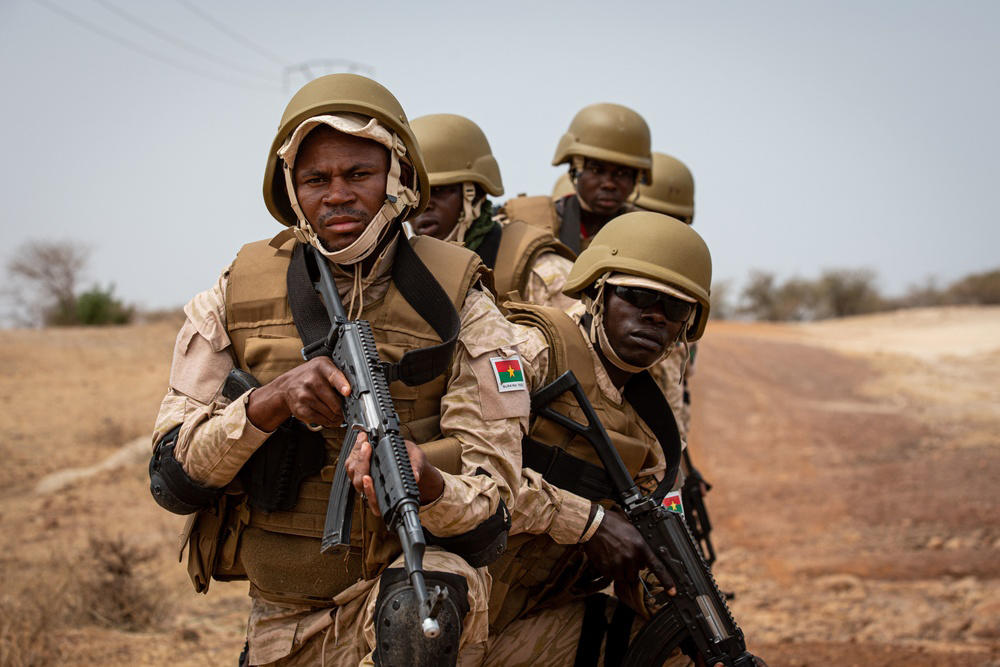 Burkinabè soldiers practice in counterterrorism exercises led by the U.S. | Credit: Sgt. Steven Lewis / U.S. Africa Command
Burkinabè soldiers practice in counterterrorism exercises led by the U.S. | Credit: Sgt. Steven Lewis / U.S. Africa Command
The Future of “Coup Contagion” in Africa
Wherever they occur, coup d’états shift power dynamics, change political and social environments, disrupt society and reform efforts, and compound crises. The recent coups that swept West Africa have rippled throughout the region, exposing similar conditions across the Sahel and coast making them vulnerable to democratic backsliding and instability. While democracy may not be dead in West Africa, scholars and policymakers must recognize the cyclical nature of the pre-requisites that keep them going. The future of coups in Africa will continue to happen in the same places and spill over into others if the conditions and responses remain the same. Regional and international communities must encourage domestic leadership and dialogue between militaries and civilians or risk further incursion of Jihadi forces.
A Dangerous New Precedent
Since 1950, the African continent has seen 214 attempted coups—the most of any region. One hundred and six were successful, and eight have occurred within the last eighteen months. Even when coups were rampant in the 1970s and 1980s, the success-to-failure ratio was 42.9% to 56.4%—low compared to the 75% success rate of the last year and a half. The high success-to-failure ratio in which the military achieves the governing body’s removal sets a dangerous new precedent: leaders emboldened to seize power instead of winning it. Even when possessing power, military juntas present challenges. Often bogged down by international sanctions, civilian opposition, and a lack of governing expertise, leaders find it challenging to consolidate authority, secure their borders, and defend against aggression. Subsequently, military governments in West Africa have been unable to protect against Jihadist insurgencies, like their predecessors, thereby refueling the same grievances that the previous government could not solve. The result is a new norm that exacerbates the humanitarian and security situations and threatens to overflow into neighboring countries with similar conditions.
The Spillover
The seven countries in West Africa and the Sahel that have undergone coups lately have three pre-requisites. The first is poor socio-economic conditions, including high food insecurity, poverty, unemployment, and inequality. Conditions that are affected by domestic policies and suffer under tumultuous political instability. The second is political instability caused by poor governance and weak institutions. Governments cannot provide essential services when systems lack capacity because of accountability or political safeguards. The third condition is a breakdown in defense and security. Jihadi and terrorist networks have exploited government incapacity and the security breakdown, exposing civilians to devastating attacks. Similar conditions are observable in neighboring and coastal countries. Côte d’Ivoire, Cameroon, the Republic of Congo, Equatorial Guinea, Benin, and Togo are sparking fears that terrorist groups in the Sahel could spill into coastal areas. Experts say that the strategic location of coastal nations makes them particularly vulnerable because of their proximity to vital supply lines for food and materials. In several African states, this is already a concern. Terrorist and armed groups are capitalizing on public frustration and a lack of governance to take control of large swaths of land. Fears have been mounting that ISIS and al-Qaeda affiliated groups are gaining a foothold in the region after several countries reported increased attacks along their borders.
A Grim Future? It Depends
While the recent coups do not spell an end to democracy in West Africa and the Sahel, they reveal a growing problem that, left unaddressed, jeopardizes the entire region’s cohesiveness. The future of coups in Africa depends on addressing these conditions. The international community must put regional actors at the helm of response efforts and work with the Economic Community of West African States (ECOWAS) to find and implement more effective forms of influence than the sanctions it has levied against Mali and Guinea for their democratic reversals. Peer-to-peer influence places significant pressure on African states, unlike outside governments and institutions whose powers are limited. Intermediaries must also encourage military juntas to foster inclusive national dialogues with the public to establish working partnerships with the communities they rule. National exchanges will allow citizens and the military to collaborate on holding new elections that are accountable to deadlines and timetables. Anything short of this will reignite the same discontent that removed past governments, thus beginning the cycle again.
Conclusion
In conclusion, democracy in West Africa and Sahel is not yet gone. However, suppose country conditions remain the same. In that case, the future of coups in Africa will continue in the same countries, threaten those along the coast, and worsen the parallel security and humanitarian crises in neighboring areas. If the international community does not reassess how it addresses these conditions and military governments cannot reach a consensus with citizens, repeating coups will be the continued reality.






